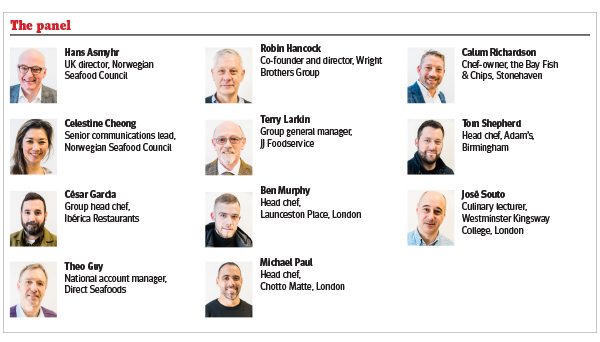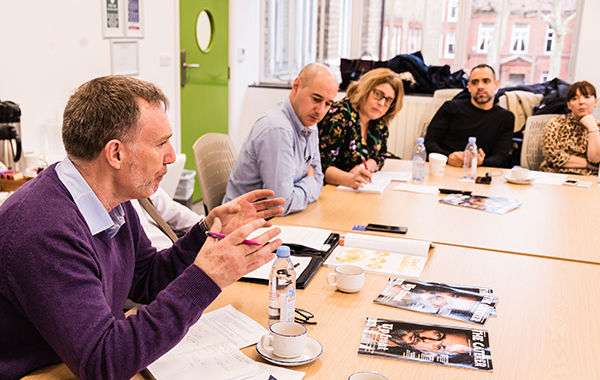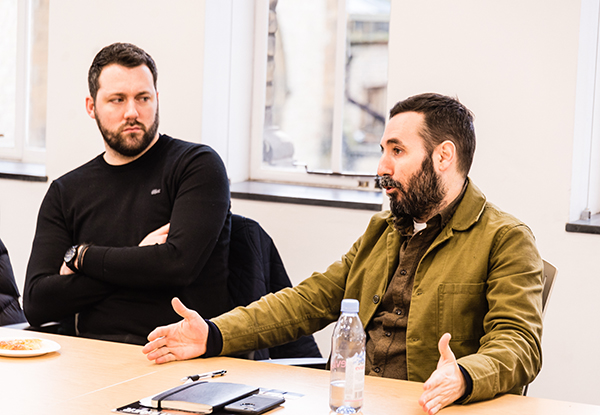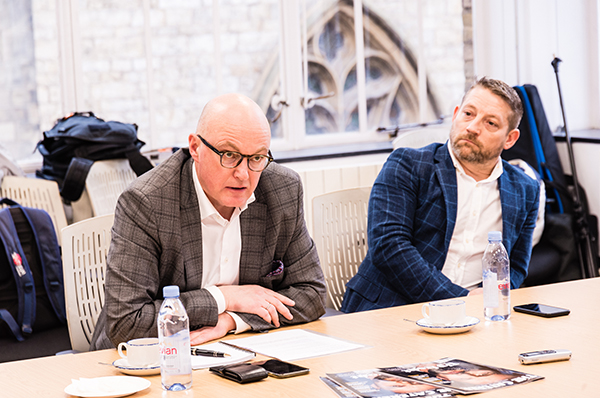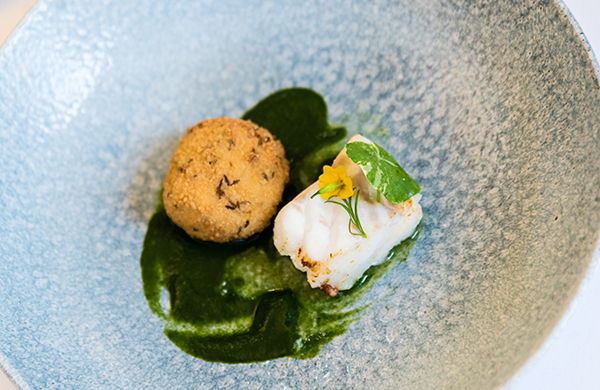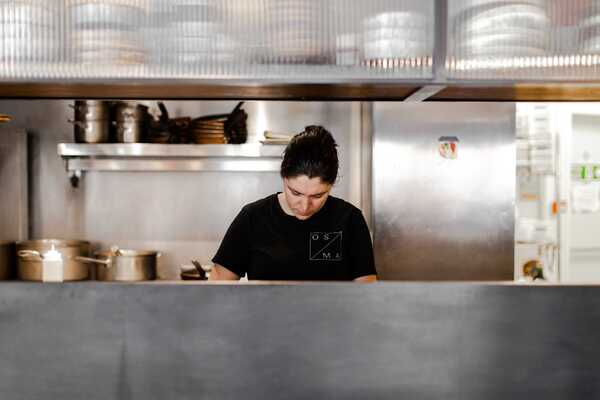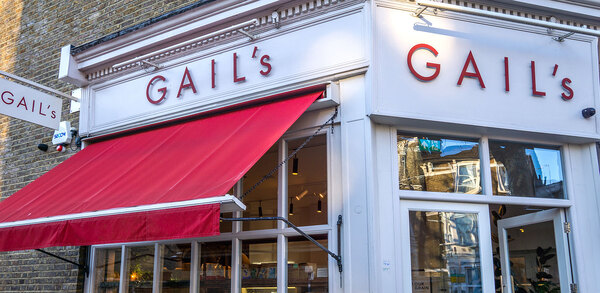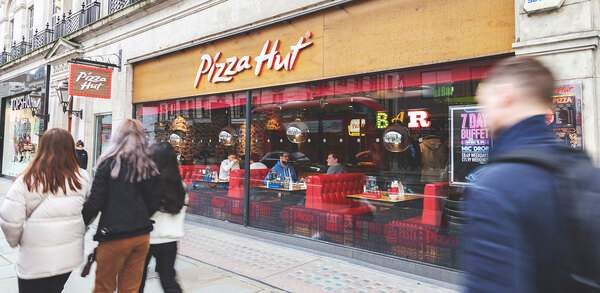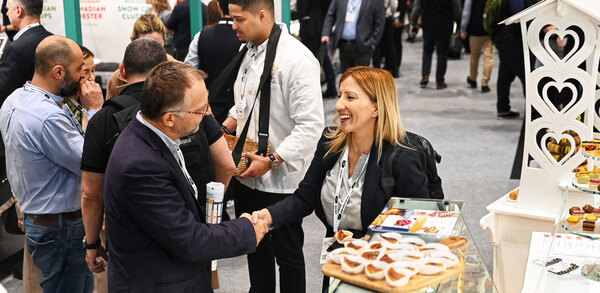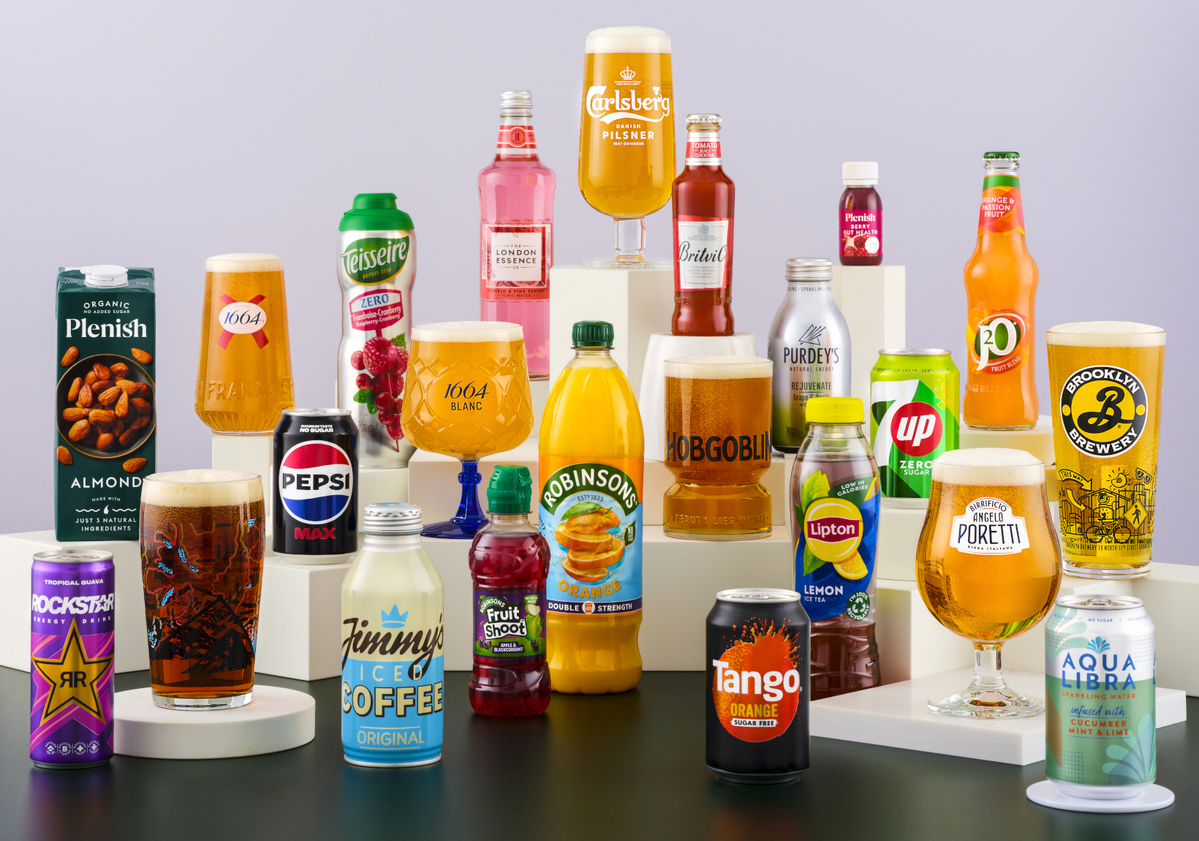Round table: how do you use fish on your menu?
A panel of chefs and suppliers joined The Caterer and sponsor Seafood from Norway at Westminster Kingsway College to discuss the use of fish and seafood on menus, what chefs need to know about fish, and what consumers expect from a restaurant's offering. John Porter reports
The panel
Considering the availability and low cost of prepared fish, is it necessary for today's chefs to learn how to fillet?
José Souto (JS):
Tom Shepherd (TS): I've been in two-Michelin-starred kitchens where they buy in fish ready filleted. Personally, I'd always buy in whole fish, which isn't just about preparation, but also because I want to check the fish - to look at the gills, the eyes.
César GarcÃa (CG): When I worked in fine dining kitchens in Spain, you worked with the whole fish, which you filleted and cleaned - but with eight restaurants in the UK, we buy the fish ready portioned. While this is mainly about costings and time, nervousness about preparing fish is also an issue among young chefs.
Michael Paul (MP): I've seen chefs who can't fillet a fish, but we all have to learn. I've improved my skills by working with Japanese chefs, and what I know now isn't what I did when I first started! We forget that this is a skill for a chef and it takes years to perfect.
There is a rising trend for kitchens to treat fish very simply - for example, east London's Brat, which is famous for its barbecued turbot. Is this something that chefs should be trying to emulate?
MP: It's too easy for restaurants to overcomplicate fish - in Spain and Portugal, for example, it's common for sole to be simply grilled and served with chips. The UK tends to go for much more complicated dishes. Simplicity is key; when I eat out, I'm just looking for a nicely cooked piece of fish.
TS: The fashion in food always changes, but in my opinion it's now going back to classic cooking - very simple, but cooked very well.
What is the general opinion of using frozen fish in a restaurant?
Calum Richardson (CR): There's definitely a place for it across the industry. Fish frozen at sea is widely used in fish and chip shops.
MP: And if you're serving raw fish in sushi or something similar, frozen fish is essential.
TS: I certainly wouldn't be scared of using frozen products - it's my prerogative as head chef if I want to do that."
Terry Larkin (TL): JJ Foodservice has produced a video showing how fish is frozen at sea, which has been really popular among chefs. I see it as our responsibility to educate our customers. As long as frozen fish is handled properly by the chef, it's fine.
Hans Asmyhr (HA): If you want to have high-quality cod or haddock on the menu all year, frozen is a good choice, because the quality is consistent.
Theo Guy (TG): For restaurants that serve a specific species, there are times when you won't be able to get that fish, and that's where the frozen at sea fish sits. But I think there is a need for education on how to thaw frozen fish.
JS: You have to temper it properly, ensuring that the fish does not sit in the liquid as it thaws. I'd implore chefs to try some of the frozen at sea fish - the quality is great.
TG: Restaurants should work more closely with suppliers to get the benefits of frozen fish. Come to our depots; come to Brixham and see our prep. Why not spend 3p-4p more a fillet and buy something that we've professionally thawed for you?
Are UK consumers eating enough fish?
CR: I think there's an age gap. People don't take fish home and cook it any more, and that's actually one of the simplest things to do. On the basis that the UK eats an average of two portions of fish a week, I believe it's the grannies holding the market up by eating four portions a week, and young people are eating next to nothing.
MP: The different ways we serve fish at Chotto Matte helps people try different dishes. We have quite a diverse menu in terms of fish, we have a sushi bar, a grill and a tempura section. Our sharing style of menu and the preparation is why people go out to eat.
HA: The issue is not limited to the UK. In Norway we have the same challenges - people are generally eating less fish. In response, the Seafood Council is running a TV ad showing on-trend serves, such as fish wraps.
Robin Hancock (RH): Our approach to serving oysters at Wright Brothers is all about dispelling the myths and encouraging people to try them. All of our restaurants offer oysters on a "pound a pop" promotion in the afternoon, so if they don't like it, no problem. It's only a pound.
TS: A single bad experience can put people off. They may say they don't like scallops, but they probably only had them one time. When they try a line-caught, well-cooked scallop, then hopefully they'll love it.
What is the availability of different species of fish in the UK?
TS: There is a huge diversity of fish species available from suppliers, such as wild turbot, halibut, scallops and mussels. Availability changes every day, and I can change the menu from turbot to brill as long as it's the quality of product I'm looking for. From a chef's point of view, I want to use all those ingredients.
TG: I'd argue there is still room for more menu diversity. We don't use pollock or coley enough - pollock is a stunning fish. Ten years ago hake wasn't considered a mainstream fish, but it's now in our top three with haddock and cod.
What are current menu trends when it comes to fish?
Ben Murphy (BM): The street food movement has also had a big influence on current trends. Good-quality fish and chips are a key menu trend, and I would say that these days you can't offer a tasting menu without fish.
RH: Whole roast turbot is becoming popular - it's actually a favourite with my own family. I think chefs need to be less cautious about serving fish on the bone.
Do chefs have a responsibility to address growing customer expectations that fish and seafood is produced responsibly?
CR: Definitely. Children now understand sustainability - schools are very good at teaching it. If you're preaching it as a business, you've got to be good at doing it. When customers trust you, they're more willing to try other species.
RH: My restaurants have benefited from the wholesale side of the business having a presence at Brixham fish market. We know every day which boats the fish are from, and we learn which fishermen handle fish well. Provenance is not just sustainability, but how well it's handled.
HA: Sustainability is very important for restaurants, the fish and chip industry and for consumers. It would now be impossible to sell cod that wasn't MSC-certified in the UK.
RH: Aquaculture and fish is what's going to feed our world in the next 50 years, so if we don't do something about educating people, we're going to be in a bad place.
The host, Westminster Kingsway College
The School of Hospitality at Westminster Kingsway College was founded in 1910 by a committee of academics including eminent chefs Auguste Escoffier and Isidore Salmon. It remains one of the most prestigious providers of vocational hospitality training in the UK.
Fish and seafood are an integral part of the curriculum, with students visiting Billingsgate and working with whole fish to learn the necessary skills.
The panel enjoyed lunch cooked by the Westminster Kingsway second- and third-year students, who prepared a meal including a dish of Skrei cod (pictured), served in the Escoffier restaurant.
www.westking.ac.uk/subject/hospitality-culinary-arts
From our sponsor
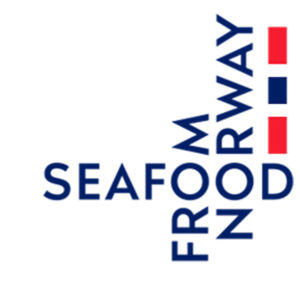
www.seafoodfromnorway.co.uk
Get The Caterer every week on your smartphone, tablet, or even in good old-fashioned hard copy (or all three!).



